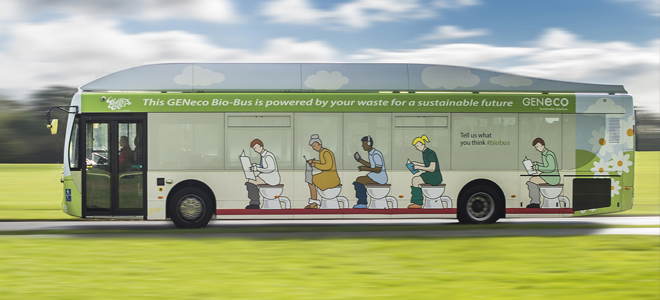New York City was first with it’s No-Idling laws, but the UK, it seems, won’t settle for #2.

Unless of course it’s the #2 (Human waste) that just happens to be fueling the first-of-its-kind city bus. The 40-seater Bio-Bus runs on fuel generated from treated sewage and food waste and helps improve urban air quality as it produces fewer emissions than traditional diesel engines. The bus can travel up to 200 miles on a full tank of gas generated at Bristol sewage treatment works – a plant run by GENeco, a subsidiary of Wessex Water. Up to 10,000 passengers are expected to travel on the Bio-Bus each month.
It’s not petrol, bio-diesel or natural gas. It’s Biomethane, and can even be used to power up to 8,500 homes, and although the bus’s graphics seem to imply it’s a moving shitter, the fuel is actually a product of Bristol sewage treatment, which treats around 75 million cubic meters of sewage waste and 35,000 tons of food waste through a process known as anaerobic digestion. The waste is collected from households, supermarkets and food manufacturers every year.
“GENeco Bio-Bus is an excellent demonstration of biomethane’s unique benefits; decarbonizing areas other renewables can’t reach,” says Charlotte Morton, chief executive of the Anaerobic Digestion & Bioresources Association (@adbioresources). “A home-generated green gas, biomethane is capable of replacing around 10% of the UKs domestic gas needs and is currently the only renewable fuel available for HGVs.
Although the Bio-Bus is new, in 2010, GENeco powered a car on biomethane produced during the sewage treatment process. The Bio-Bug was used in various trials to see how viable it was to power a vehicle on sewage gas.



